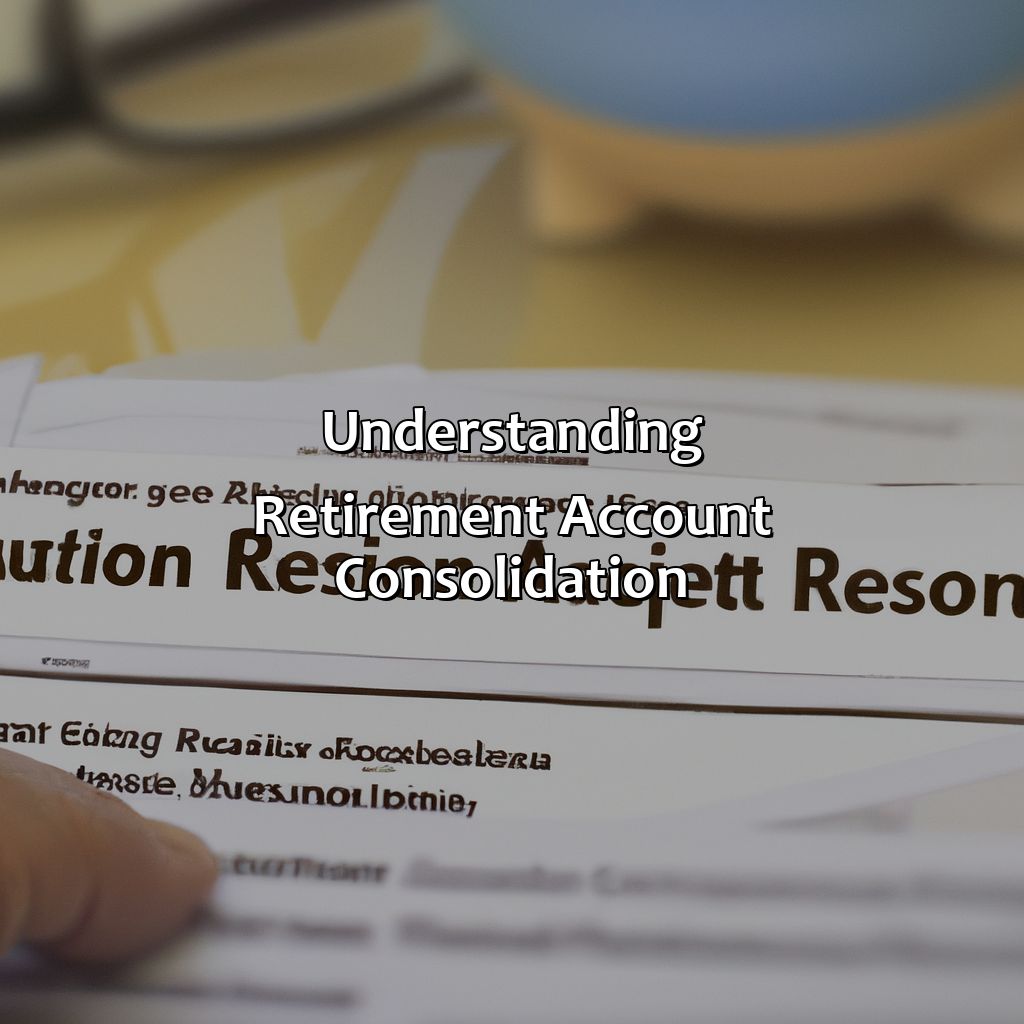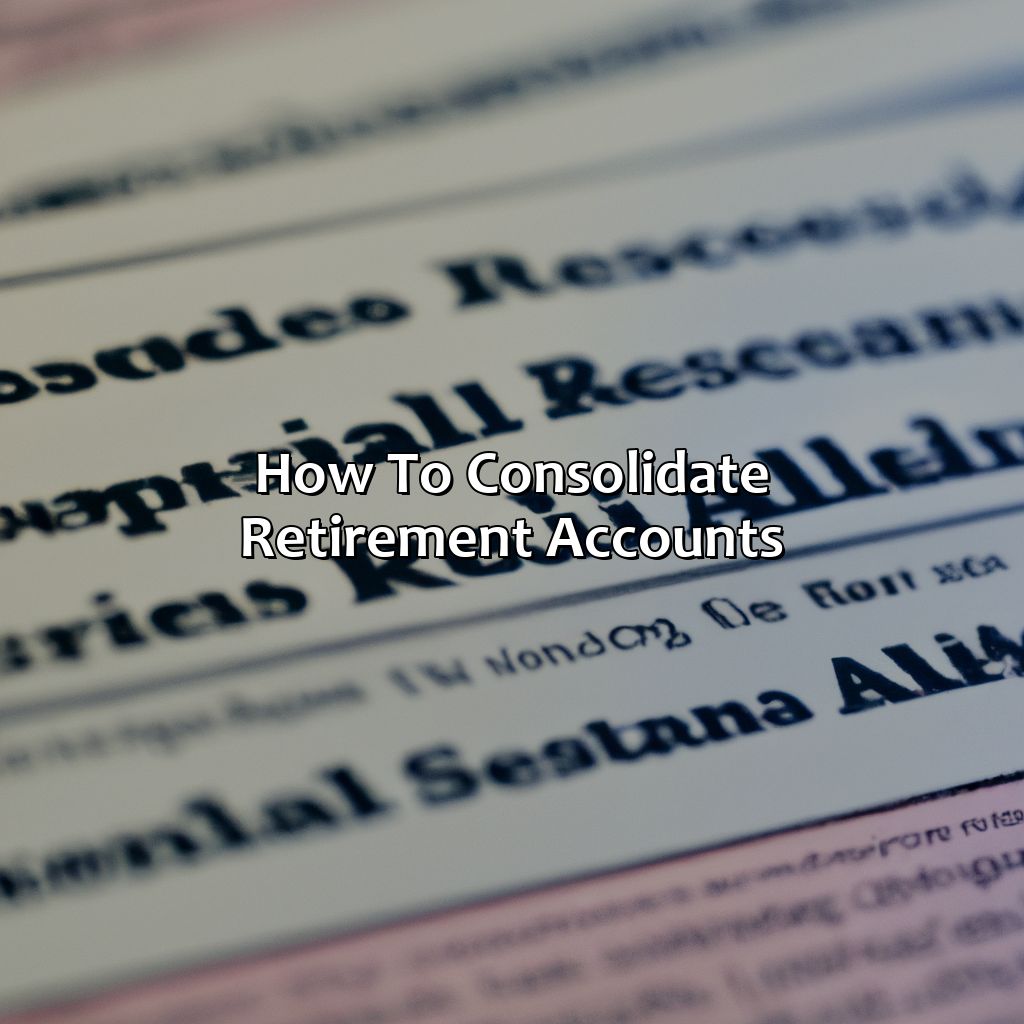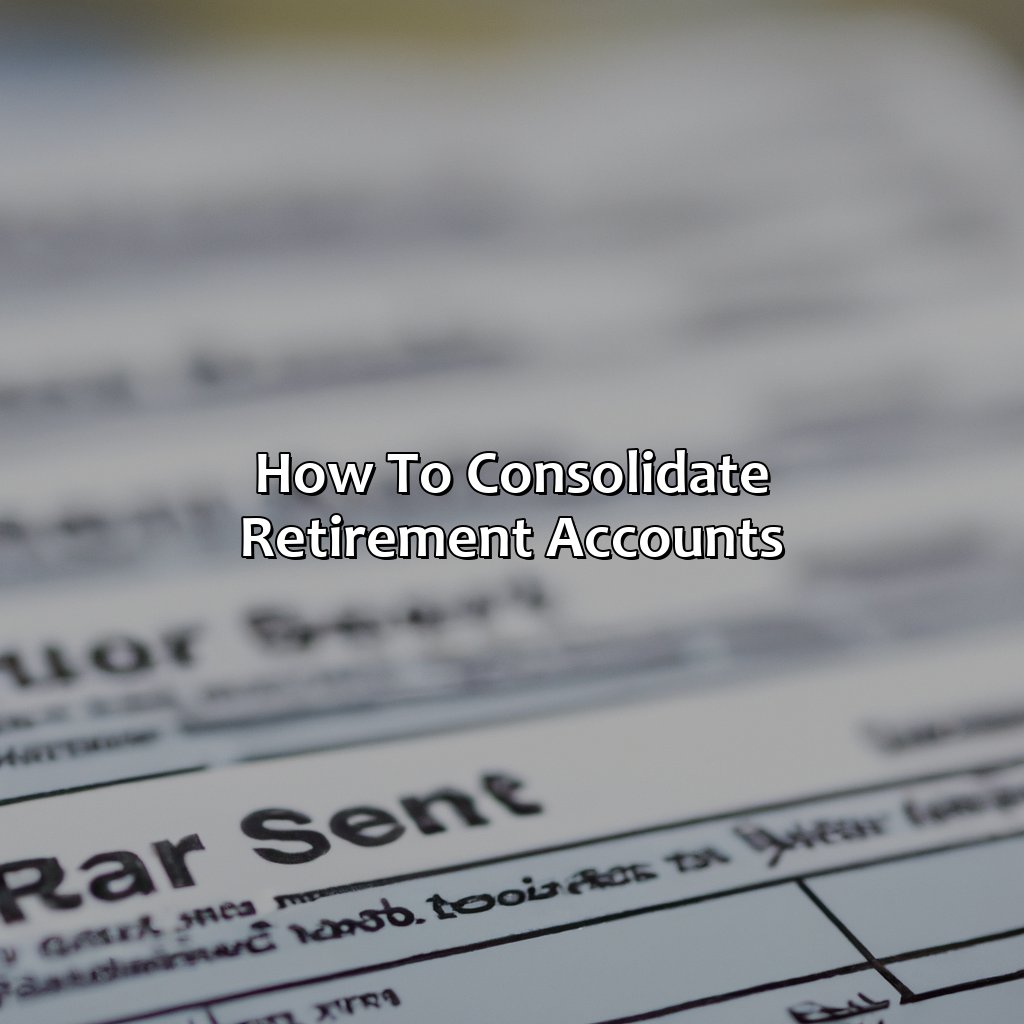How To Consolidate Retirement Accounts?
Key Takeaways:
- Consolidating your retirement accounts can save you time, money, and hassle. By bringing all of your retirement accounts together, you can better manage your investments, reduce fees, and streamline your finances.
- Retirement account consolidation is especially beneficial for those who have multiple accounts from previous employers or have moved around frequently. It can also be a good option for those who want to simplify their finances and focus on their retirement goals.
- To consolidate your retirement accounts, you should start by reviewing your current accounts and determining which ones you want to consolidate. Then, you can choose a retirement account provider and fill out the necessary paperwork to transfer your funds. It’s important to avoid common mistakes, such as cashing out your accounts or losing track of your investments.
Are you trying to keep track of multiple retirement accounts? You can simplify things by consolidating them into just one account. In this article, we discuss how to successfully consolidate your retirement accounts.
Understanding Retirement Account Consolidation
Do you have multiple retirement accounts? Consider consolidating them! Consolidating accounts has many advantages. These include:
- Easier retirement planning.
- Improved financial management.
Who should consider consolidating their retirement accounts? Analyse your current finances to find out.

Image credits: retiregenz.com by Harry Woodhock
Benefits of Retirement Account Consolidation
Retirement Account Consolidation can bring a host of benefits for individuals seeking to optimize their retirement savings plan. By bringing all retirement accounts into a single account, one can enjoy an array of advantages.
- Reduced fees and convenience as the consolidated account will have lower maintenance fees, making it easier to manage.
- Better control over investments as it allows for a streamlined investment strategy with the ability to diversify portfolios.
- Higher returns on investment due to an efficient investment strategy and reduced expenses.
- Simplified tax preparation, as it minimizes paperwork and makes it easier to track down contributions and withdrawals for tax purposes.
- Easier estate planning by reducing administrative complications regarding inherited retirement accounts.
- Greater transparency with consolidated accounts providing greater visibility in one place.
Additionally, consolidation makes rolling over funds much more manageable when switching employers or retiring.
Pro tip: Seek guidance from financial advisors who can provide valuable insights to help you make informed decisions when consolidating your retirement accounts.
Consolidating your retirement accounts is like Marie Kondo-ing your financial life, but instead of sparking joy, you’re sparking savings.
Who Should Consider Consolidating their Retirement Accounts
Consolidating retirement accounts is a big decision that should not be taken lightly. Individuals who are considering this option should do their research and understand the potential benefits and drawbacks.
The following groups may benefit from consolidating their retirement accounts:
- Individuals with multiple retirement accounts from previous employers
- Retirees who want to simplify their finances and reduce fees
- Those who want to increase investment options
- Individuals who need better control over their retirement savings
- Anyone looking for a clearer picture of their financial future
It is essential to evaluate the costs, benefits, and risks associated with consolidating retirement accounts. This step can be helpful in determining if consolidation aligns with one’s financial goals.
Pro Tip: Before consolidating your retirement accounts, consider consulting a financial advisor to ensure that you are making the right decision that pays off in the long run.
Get your retirement accounts in one place, because nobody wants to spend their golden years juggling paperwork like a circus clown.
How to Consolidate Retirement Accounts
For an efficient retirement account consolidation and a streamlined investment portfolio, do these steps:
- Gather your retirement account statements and investment portfolio information.
- Review the investment options for each retirement account and compare their prices and fees. Consolidate accounts to minimize fees paid and simplify management.
- Assess your investment portfolio. Ensure your investments align with your objectives and risk tolerance.
- Sell poorly performing investments and reinvest in solid performers, according to your financial goals.
- Review your investments periodically and adjust the portfolio as needed.
Plus, dodge errors that can hurt your investments.

Image credits: retiregenz.com by David Arnold
Steps for Consolidating Retirement Accounts
When it comes to merging retirement accounts, you need to take necessary steps to ensure a smooth process. So, how can you consolidate your retirement accounts? Here’s what you should do:
- Gather Information: To start the consolidation process, you must gather all the information regarding your existing retirement accounts that you want to merge.
- Choose an Account Type and Custodian: Next, select the type of account you want to transfer your savings into and choose a reliable custodian of that type of account.
- Initiate Transfer: After selecting the custodian, initiate the transfer process by contacting them directly or online. Fill out any necessary forms for transferring your previous funds into a new account.
- Monitor Your Accounts: Regularly monitor the progress of transferring funds between accounts until everything is processed correctly.
It is essential to note that this transfer process may take several weeks or months and may have taxes associated with it.
If multiple retirement accounts are causing confusion, consolidating them into one account will help adopt better track-keeping practices.
According to a recent survey by Charles Schwab (2021), nearly 9 in 10 people believe everyone should regularly review their investments.
Consolidating your retirement accounts: the process that can make you feel like a financial Tetris champion – just try not to drop any pieces along the way.
Common Mistakes to Avoid
When it comes to merging retirement accounts, there are specific mistakes that you should avoid. These errors could cost you your savings and even risk your retirement plan.
- Not considering fees and expenses can lead to additional charges from the new account.
- Failing to account for penalties can incur early withdrawal costs.
- Forgetting about vesting periods may mean losing employer contributions or matchings.
- Mixing pre-tax and post-tax funds without careful consideration of tax implications can result in extra taxes owed the following year during filing season.
It’s important to note that a qualified financial advisor can guide you through this process but be wary of the financial advisor’s fees as they add up quickly.
Moving forward, one of the best ways to handle consolidation is with a direct rollover– this is because it enables an investor to move their funds directly between accounts instead of touching them personally. Once you consolidate, choose an investment strategy for moderate returns based on your age and desired level of risk tolerance. Revisit this decision every few years when you approach a different life stage or whenever regulations change.
Lastly, consolidating your retirement accounts helps avoid the headache of managing multiple assets, resulting in peace of mind as well as building toward a comfortable future retirement. Keep these points in mind during consolidation planning if you don’t want to make the aforementioned mistakes!
Five Facts About How To Consolidate Retirement Accounts:
- ✅ Consolidating retirement accounts can simplify your financial life by reducing fees, paperwork, and administrative tasks. (Source: NerdWallet)
- ✅ Consolidating retirement accounts can give you a clearer picture of your retirement savings and investment strategies. (Source: Forbes)
- ✅ Consolidating retirement accounts may allow you to access investment options or benefits that were not available in your previous accounts. (Source: CNBC)
- ✅ The process of consolidating retirement accounts typically involves rolling over funds from one account into another, such as from a 401(k) to an IRA. (Source: Investopedia)
- ✅ It is important to review the terms, fees, and tax implications of consolidating retirement accounts before making any decisions. (Source: US News & World Report)
FAQs about How To Consolidate Retirement Accounts?
What does it mean to consolidate retirement accounts?
Consolidating retirement accounts means combining multiple retirement accounts into one account. This can simplify your retirement planning, streamline your investments, and potentially save on fees.
What are the benefits of consolidating retirement accounts?
Consolidating retirement accounts can provide several benefits, including a clearer picture of your retirement savings, easier management of your investments, and possibly lower fees. Additionally, consolidating can make it easier to track and adjust your investment strategy as you approach retirement.
What types of retirement accounts can be consolidated?
Most types of retirement accounts can be consolidated, including 401(k)s, IRAs, and pensions. However, it’s important to note that some types of accounts, such as Roth IRAs, may have different tax and contribution rules than traditional IRAs and should be consolidated carefully.
How do I consolidate my retirement accounts?
To consolidate your retirement accounts, you may need to transfer funds from one account to another. This can typically be done through a direct transfer or rollover. Prior to making any transfers, it’s important to check with your financial advisor to ensure that you are making the right decision for your financial situation.
Can consolidating my retirement accounts affect my taxes?
Consolidating your retirement accounts may have an impact on your taxes. For example, transferring funds from a traditional IRA to a Roth IRA may result in a taxable event. It’s important to consult with a tax professional to understand any potential tax consequences before consolidating your accounts.
What should I consider before consolidating my retirement accounts?
Before consolidating your retirement accounts, consider factors such as fees, investment options, and tax implications. You should also consult with your financial advisor to ensure that consolidation is the best move for your individual financial goals and circumstances.







